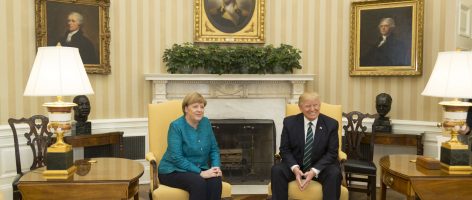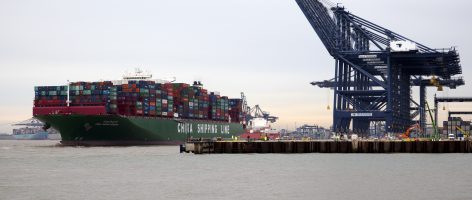
Merkel can make her second Trump visit a success
German Chancellor Angela Merkel, who meets with Donald Trump next Friday, hopes to improve on their inaugural tête-à-tête in March 2017 when the U.S. president appeared to withhold shaking her hand during an Oval Office …

The Open Door Swings Back: The Challenge of Chinese Investment
On 26 February, the Taurus docked at pier 3 in Greece’s rebuilt port of Piraeus. At nearly two hundred thousand tons, the ship is longer than four football fields and capable of …
How Germany can reframe the US-China trade debate
By Peter Rashish in Handelsblatt Global on April 4, 2018.

Transatlantic Cooperation on Blockchain: Getting Ahead of the Curve
To great relief around the world, in mid-March Angela Merkel was sworn in as Federal Chancellor for the fourth consecutive time. This puts an end to the almost six-month long …

Trade Imbalances: Does the German Current Account Surplus Need to Be Corrected?
U.S. president Donald Trump has recently imposed tariffs on imports of steel and aluminum. The goal of his protectionist approach is to protect the domestic industry against competition he views …
Recent Authors
AGI provides knowledge, insights, and networks as tools to solve the challenges ahead.
Support Our Work
National Myths are an Unreliable Guide to Trade Policy
March Madness: it would be tempting to describe recent U.S. trade policy that way. First, the Trump administration imposed tariffs of 25 percent on U.S. steel imports and 15 percent …

Steel Tariffs are a Distraction from Transatlantic Cooperation on China
The White House’s decision on March 8th to impose tariffs on imported steel and aluminum is not without precedent: President George W. Bush did something similar in 2002 when there …
Judy Asks: Is Europe Ready for a Trade War with Trump?
Featuring Stephen Szabo via Judy Dempsey’s Strategic Europe on March 14, 2018.

Trump’s Tariff Policy Present – and Yet-to-Come
Trump Rescinds Steel, Aluminum Tariffs Amid Concerns for Auto, Construction Industries Washington, December 20, 2019 – Stating that he wanted to avoid “too much of a good thing” for …
„Die EU sollte sich nicht provozieren lassen“
Der US-Handelsexperte Peter S. Rashish über Trumps Strafzoll-Drohungen und die Folgen. Featuring Peter Rashish with the Sächsische Zeitung on March 3, 2018.
Mehr als jeder zweite Deutsche hält Beziehung zu USA für zerrüttet
Featuring Peter Rashish via Handelsblatt on February 28, 2018.

Philipp Liesenhoff, AGSR Fellow
AGI is pleased to welcome Philipp Liesenhoff as an AGI/GMF Fellow with the American-German Situation Room in Washington, DC, until June 2018. In Germany, Philipp Liesenhoff works at the German …



